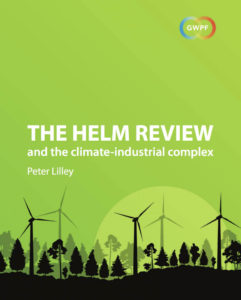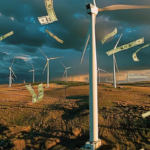Eerder schonk ik aandacht aan de ‘Green Blob’.
‘Green blob’ is de term die werd gemunt door de ontslagen Britse minister voor milieu, Owen Paterson, Het is een groene, vormloze, slijmerige massa die overal doordringt. Daarmee bedoelde hij de groene lobbyisten die in elke geleding van het Britse establishment werkzaam zijn.
Zie hier.
De Britse conservatief, Peter Lilley, voormalig minister voor handel en industrie, kwam onlangs met eenzelfde waarschuwing in een nieuw rapport van de ‘Global Warming Policy Foundation’ (GWPF), getiteld: ‘“Climate-Industrial Complex” Wasting £100 Billion And Shutting Down Debate’.
Ik pik er een aantal krenten uit.
 Former Trade and Industry Minister, Peter Lilley warns that vested interests in the renewables industry, politicians of all parties, the bureaucracy and academia have together largely suppressed debate about their reckless waste of public money exposed by the government’s own Review of the Cost of Energy by Dieter Helm.
Former Trade and Industry Minister, Peter Lilley warns that vested interests in the renewables industry, politicians of all parties, the bureaucracy and academia have together largely suppressed debate about their reckless waste of public money exposed by the government’s own Review of the Cost of Energy by Dieter Helm.
In a paper published by the Global Warming Policy Foundation, Peter Lilley highlights Professor Dieter Helm’s devastating critique, outlined in the Cost of Energy Review which was commissioned by the government. “Helm shows that the Climate Change Act objective of cutting emissions of carbon dioxide could have been met for a fraction of the £100 billion so far committed, which has already raised the cost of energy by 20%.”
Lilley argues that, even more significant than the reckless waste of public money exposed by Professor Helm is the success of the vested interests – industrial, political, bureaucratic and academic – in dampening any debate about it. “Normally waste on this scale would cause an outcry in Parliament and elsewhere. But the vested interests simply damned Helm’s review with faint praise and consigned it to oblivion.”
It is evidence, Lilley claims, that President Eisenhower’s famous warning against the power of not just the ‘military-industrial complex’ but also similar combinations in areas of civil policy is coming true. “As Eisenhower presciently warned: ‘…a government contract becomes virtually a substitute for intellectual curiosity…The prospect of domination of the nation’s scholars by Federal employment, project allocations, and the power of money is ever present and is gravely to be regarded’. We are seeing the emergence in the UK of a powerful ‘climate-industrial complex’”.
“Moreover, if the climate-industrial complex can show such reckless disregard for basic economic truths, there is a danger that they may be equally careless in exaggerating the risks arising from global warming science (the basic truth of which, as a scientist, I entirely accept). Most scientists remain scrupulously objective in their own work. But they know it is more than their career is worth to question exaggerated claims others may make of the scale, speed or impact of global warming. So, alarmist claims go unchallenged while evidence that we could adapt to global warming rather than try to prevent it is played down.”
Zie verder hier.
 Het volledige rapport is hier toegankelijk.
Het volledige rapport is hier toegankelijk.
Lilley’s betoog bevat vele waardevolle en alarmerende observaties. Het is alleen jammer dat hij Dieter Helm volgt in diens pleidooi voor een CO2–belasting.
De wetenschappelijke discussie over het effect van een verdubbeling van de CO2-concentratie in de atmosfeer op de gemiddelde wereldtemperatuur is nog in volle gang. Zowel onder de protagonisten van AGW (‘Anthropogenic Gloal Warming’) als de antagonisten lopen de schattingen daarvan fors uiteen. Waarschijnlijk is dit effect gering en niet alarmerend. En uit de modellen van de milieu-economische mainstream komt naar voren dat een geringe opwarming van de aarde positieve effecten heeft voor de mens en de natuur. Pas bij een stijging van zo’n 2 graden Celsius zou een omslagpunt worden bereikt.
Daarnaast heeft een CO2–belasting negatieve economische effecten. Indien slechts een beperkt aantal landen daartoe zou besluiten, en de rest van de wereld niet, zou zulks de welvaart van de betrokken landen en hun internationale concurrentiepositie ernstig aantasten, zonder dat dat – volgens de gangbare klimaatmodellen – enig meetbaar effect op de gemiddelde wereldtemperatuur zou hebben. ‘All pain and no gain’.






Ik heb van dichtbij en bewust meegemaakt hoe de markt ontstond , met ‘pioniers’ in Friesland die een windmolentje bouwden maar toen nog door iedereen uitgelachen, tot de huidige situatie, zoals hierboven beschreven. Ongelooflijk hoe zaken zich kunnen ontwikkelen en zaken voor wáár worden aangenomen, waarvan je dacht dat dat nooit zou kunnen omdat mensen het niet zouden accepteren , zeker niet zij, die over de kennis beschikten. Maar mensen kun je alles laten geloven en mensen met kennis verloochenen de kennis die ze opdeden tijdens hun jarenlange studie ( TU ) om maar het woord van de baas te spreken op straffe van ontslag.
Hieronder mijn reactie op een artikel van Ton de wind, CEO van Elektraned in de bekende positivo retoriek: “Als groot voorstander van een snelle energietransitie pleit ik óók voor realiteitszin. Het is contraproductief om vanuit ideologie evidente problemen te ontkennen. Heb desondanks vertrouwen dat we het kunnen oplossen. ”
Mijn commentaar : ” Vóórdat Henry Ford startte met de productie van de T- Ford , was het probleem van de banden opgelost. ( vulcanisatie ) . Zonder banden was het lastig auto ’s bouwen geweest. Zo niet in de handel van de Ton’s de Wind, die gewoon begonnen met het bouwen van windparken op subsidie, wetend dat de overheid wel zou bijspringen, nádat er geen weg meer terug was. “.
Henry Ford werd natuurlijk niet geholpen door de overheid. Het is evident- zonneklaar- dat de eco- ondernemingen geen echte ondernemingen zijn, want geen enkele ondernemer zou investeren in een productiemiddel als een windmolen of zonnepaneel, omdat die verlieslatend zouden zijn in een normaal productieproces . Eco ondernemingen zijn aldus dor de staat gestuurde bedrijven. De bedrijfswinst wordt behaald door de balans aan te vullen met een lening ‘om niet ‘ ( subsidies ) . Politiek, industrie en universiteiten werken innig samen. Het meest recente is wel het waterstofproject van Stork . Het publiek mag nog wat sputteren op sites als deze en Linked – in, maar dan is alles meestal al ‘in kannen en kruiken ‘ en , volgens een bekend gezegde dan : ‘nemen gedane zaken geen keer” todelejokie !!!
Ja Bert het is allemaal verschrikkelijk
Nu zou een oplossing een belasting op CO2 uitstoot kunnen zijn waarbij de markt bepaald wat de goedkoopste manier van verminderen is
Dat was veeeel goedkoper geweest in plaats van de overheid die de winnaars kiest
Maar ja de reaguurders hier klagen nu eenmaal graag dat de gekozen oplossing veeeel te duur is en noooooit kan werken
Dat is veel makkelijker dan ergens voor zijn
Jammer hoor
Jan, iedereen op deze site weet dat jij gewetenloos dezelfde onzin blijf herhalen, maar is het echt nodig om steeds om die afranseling te vragen? Dat psychopathische is redelijk voorspelbaar, maar dat masochistische is echt niet om aan te zien. Wat vinden je vrienden (de vogeltjes?) eigenlijk van dit gedrag?
Oh Tije je wil zeggen dat je ook geen oplossing hebt en zelfs de voor de hand liggende oplossing van een rechtse thinktank zonder enige argumentatie afwijst
Maar blijf lekker geloven in je eigen gelijk wat niet onderbouwd wordt door enig wetenschappelijk onderzoek
Jan, het is echt schandalig hoe jij steeds opnieuw weer je onzin herhaalt, ook nu weer richting mij. Heb je dan werkelijk geen gevoel in je donder? Stop toch eens op je steeds bloot te geven op deze site. Wat vind je daar zo fijn aan? Is het de pijn die je voelt wanneer men je argumenten neersabelt?
Tije
Probeer nu eerst eens uit te leggen waarom iets onzin is in plaats van steeds hetzelfde te herhalen zonder enige inhoud
Dus begin eens om duidelijk uit te leggen waarom CO2 geen opwarmend effect heeft
Natuurlijk wel met een goede wetenschappelijke bron dus niet een of ander blogje te copieren
Want mijn argumenten worden hier meestal genegeerd en niet neergesabeld
Jan, ik kijk wel uit met jou te geven wat je wilt. Mijn ervaring is dat je geen grenzen kent, je gaat maar door, onstilbaar. Dat is dat gevoelloze zeg maar, dat psychopathische….
Maar de meeste mensen hier negeren jou, inderdaad. Dat is een vorm van agressie, heel rot voor je. Maar ik begrijp werkelijk niet wat jij er fijn aan vindt genegeerd te worden. Is het de masochist in jou die er van opleeft? Je moet het wel fijn vinden, want je komt hier immers al jaren, op dagelijkse basis.
Oh Tije je bedoelt dat je je mening niet kunt onderbouwen en dat je weet dat ik waar je ook mee komt ik het binnen 19 minuten onderuit kan schoffelen.
Jammer hoor, goed dat je diep in je hart weet dat je er naast zit.
En daar ben ik voor hier om de leegheid van de ” sceptische” positie duidelijk te maken aan de argeloze voorbijganger
Time, nog even een voorbeeldje
Jeroen Hetzler beweert
” Hoe zit het dan bijvoorbeeld met de Romeinse en Middeleeuwse opwarming? Wijnbouw tot in Schotland?”
En waar zijn we drie dagen later? nog steeds geen onderbouwing behalve
” Er groeiden toen bijvoorbeeld wijnranken in Engeland en perziken in Vlaanderen en ook was er toen de kolonisatie van het zuiden van Groenland door de Vikingen (985 – begin 15e eeuw)’
Tijdens de Romeinse Opwarming was wijnbouw mogelijk tot in Lincolnshire.”
Iets wat ik binnen 5 minuten had weerlegd als wel mogelijk, leugentje van Jeroen of gewoon onbekwaam?
Tije, reageer toch niet meer op hem. Het enige resultaat is, dat er nog meer voorspelbare tekst komt waar we ongelezen doorheen moeten scrollen op zoek naar de echte discussie.
Inderdaad weer meer minnetjes en minder inhoudelijk commentaar.
Ik neem aan dat je met de ” echte discussie” bedoelt dat je op zoek bent naar meningen die jouw opinie bevestigen, onderbouwing verder niet noodzakelijk
Wat een armoe
– de meerkosten t.g.v. de inpassing van “hernieuwbaar” zijn een feitelijke belasting.
– als het AGW-monster echt bestaat is “hernieuwbaar” vergelijkbaar met het schieten met een mug op een olifant.
Ergo: het AGW-monster is alleen te bedwingen door de inzet van kernenergie.
Nu ga jij beweren dat kernenergie duur is.
So what?
Je hoeft geen rekenmeester te zijn om in te zien dat het goedkoper is dan “hernieuwbaar” en bovendien zuiniger is met het verbruik van eindige voorraden grondstoffen.
Ja inderdaad de meerkosten zijn een feitelijke belasting, de vraag is of het de goedkoopste manier is om de CO2 uitstoot te verminderen, en aangezien de overheid slecht is in het kiezen van de meest bedrijfsmatige oplossing is dat meestal niet het geval. We betalen dus te veel voor te weinig resultaat.
Dus als je denkt dat we het AGW monster alleen kunnen bedwingen met kernenergie dan zal dat dus de goedkoopste oplossing zijn en bedrijven zullen er snel in investeren in plaats van in zon / wind en energie efficiency.
Maar dat is alleen maar de theorie natuurlijk van het GWPF en Richard Toll en natuurlijk ook van James Hanssen die ook een voorstander is van kernenergie.
Maar ik begrijp dat de ” sceptici” hier liever heel hard NEE blijven roepen om vooral maar door te gaan op de meest inefficiënte weg
inefficiënte weg? Onderbouwen graag!
Nou Scheffer LEES het GWPF rapport
Conclusie: groen moet het “hernieuwbare” energie-akkoord naar de prullenbak verwijzen.
Dat zal wel even slikken zijn, maar het AGW-monster is dan wel te beteugelen.
Iedereen blij, ook degenen die wat voorbehoud hebben over het bestaan van het monster.
Nou Boels ik ben er niet op tegen, maar dan nu even op rechts de weg vrij maken voor een belasting op CO2. En dan zal je toch moeten beginnen met het toegeven dat Co2 vermindering een
goed idee is.
Ik ben er voor!
Voor mij hoeft CO2-vermindering niet, kernenergie wel.
Of de kosten via de ene of de andere belastingvorm worden gedekt is mij om het even.
What in a name?
Maar ik vermoed dat als alle subsidietoezeggingen voor “hernieuwbaar” worden ingetrokken er wellicht nog geld over is voor een ijsje voor iedereen.
Best J van de Heijden….
Jouw basis is dus dat ‘rapport’. Nou laten we voor de grap nou eens aannemen dat ‘we’ werkelijk zouden geloven dat ons al dit soort ellende boven het hoofd hangt.
Dan zijn er natuurlijk tal van maatregelen die er genomen zouden kunnen worden, zoals bv het decimeren van het vliegverkeer, het verbieden van vleesconsumptie en het reguleren via bonnen systemen van energie kwoota. Allemaal van dat soort geharnaste maatregelen die de CO2 uitstoot direct zouden verminderen.
Wat bijvoorbeeld te denken van het verplaatsen van die windsubsidiestromen naar derde wereldlanden om daar een mooie schone kolentechnologie te introduceren en zo de houtkap en openbare verbranding van bossen te voorkomen. Verbieden van die krankjorume houtversnippering en andere biofuels!
Allemaal veel efficiënter dan dat Groenlinkse postzegel geleuter.
Nou dat gebeurt natuurlijk allemaal niet. Waarom eigenlijk niet….Omdat er een ‘ecoindustrieel complex’ is opgebouwd met windmolens, zonne-energie en nu opeens ‘waterstof’ als reddende planeet engelen.
Nou kan deze site uitstekend rekenen en bestaat er een behoorlijk ontwikkeld inzicht in de wetten van energie en thermodynamica. Bovendien wordt er tot in te treuren aangegeven dat zonder ‘opslag mogelijkheden’, (de gevulcaniseerde banden van Pijnse) iedere vorm van renewables en de toepassing ervan in bijvoorbeeld het wegverkeer alleen maar zullen leiden tot een nog grotere overproductie van elektriciteit op momenten dat je hebt niet nodig hebt.
Die moet dan ergens heen! Nu dan maar naar ammoniakcentrales! Dat is de radeloze uitweg van het ecocomplex!
En dan is de eenvoudige rekensom dat aan het eind….de energie opbrengst van waterstof keten veel lager ligt dan je erin stopt.
En dat beste van der Heijden geldt voor iedere ‘renewable keten’ mm.
Dat betekent dus van der Hejiden renwables elkaar niet kunnen ‘renewablen’ zonder enorme energieverliezen.
Dat geldt voor pompage turbinage (plan Lievense) t/m de accu’s van Tesla. Dat lukt namelijk niet met elektriciteit wat toch maar een energieafval produkt is, en dat er ergens in de keten andere energie moet worden toegevoegd waarbij fossiele brandstoffen een essentiële voorwaarde zijn.
Bruinkool., gas, olie, kolen je weet het vast wel. Als ‘back up’ en voor de bouw van al die ‘renewable afval fabrieken’
En als je dan wilt weten hoe dat in de praktijk werkt kijk eens even naar Duitsland, dan ie je het levende bewijs voor je, Hogere CO2 uitstoot bij een onzinnig kostbare subsidie exercitie in het ongerijmde.
Dus beste van der Heijden, misschien heb je de beste bedoelingen met het mensdom, maar eh renewables zijn de geweren van het eco complex en hun kapitaalsvernietiging dmv subsidies, waarmee je jezelf in de voet schiet en de ‘kar achter de wagen spant’
Gerard
Er wordt hier inderdaad tot vervelens toe herhaald dat hernieuwbaar zonder opslag geen oplossing is
Maar laat de markt het uitzoeken wat de goedkoopste manier is om de uitstoot te verminderen
Maar “sceptici” zijn bang dat het resultaat meer wind en zon is en niet de geliefde kerncentrales
Bovendien kunnen ze dan niet meer zeuren over de subsidie stromen om zo beleid te traineren
Beste van de Heijden….tot vervelens toe? Dat heb je ervan als er lezers zijn zoals jij die denken dat de wetten van de thermodynamica/energie zomaar terzijde kunnen worden geschoven.
Een appel valt ook zelden omhoog:), zelfs niet als de ‘markt’ of ‘de groenen’ het zouden beweren. In dat geval zou je misschien trouwens wel overtuigd zijn, maar ja dat zijn de wat simpeler mechanica wetten van Newton.
Of geloof je soms stiekem toch in een perpetuum mobile?
De markt wordt trouwens weer door heel andere wetten beheerst en shareholders weten precies op welke sentimenten ze moeten ronddobberen. Maar vergis je niet…..ze laten ze zo weer vallen, als de renewables illusies aan diggelen vallen en de subsidie kranen dichtgaan.
Shell heeft zo juist erg veel geboden voor licenties om te mogen boren voor de kust van Mexico
https://www.businessinsider.nl/hoe-shell-slim-profiteerde-van-kennisvoorsprong-9-kansrijke-olievelden-de-golf-van-mexico/
Die weten prima waar ze moeten zijn…..
Gerard,
ik heb vertrouwen in de markt en denk dat die prima goedkoop en snel de uitstoot van CO2 kunnen verminderen.
Shell rekend dan ook al met een interne prijs voor CO2 van EUR 40/ton
“At Shell, we typically assess the GHG risks on all our planned ventures, including existing operations that undergo substantial modifications, applying a GHG project screening value (PSV) to the base case economics against scope 1 and 2 emissions for all new projects since 2000. Since 2008, our GHG PSV has been $40 per tonne. The GHG PSV is estimated of the long-term potential costs that Shell assets could incur as a result of governments taking actions to reduce CO2 emissions. ”
https://www.shell.com/sustainability/sustainability-reporting-and-performance-data/performance-data/greenhouse-gas-emissions/_jcr_content/par/tabbedcontent/tab/textimage.stream/1498657834094/cd985bc8ba892136dc8cab0e44bb02be64df7c25a00df0bd9ad8ede6c838e245/2017-cdp-climate-change-submission.pdf
Janos, ben je van het geloof af?
“Maar laat de markt het uitzoeken wat de goedkoopste manier is om de uitstoot te verminderen.”
Al mijn klompen in één keer gebroken ;-)
Een zinnig mens zou toch graag de beste oplossing voor een al dan niet bestaand probleem willen.
Met “hernieuwbaar” kietel je alleen degenen die geloven in de maakbare natuur met magische krachten en degenen die een bankbiljettenmagneet in werking weten te zetten; een soort pestcodeloterij.
Onder politieke druk sluizen pensioenfondsen miljarden naar de Graaimaneilanden waar de groene graaiers verblijven die o zo graag aan luchtfietserij doen onder het mom van het redden van de planeet.
Een democratisch hart krijgt ritmestoringen als je ziet dat door de kiezer afgeserveerde politici een prominente rol spelen in de “transitie”.
De ervaring van de kiezer speelt geen enkele rol, de “ervaring” van gesjeeste politici wel.
Op dat punt heeft het FvD en de PVV gelijk: het is een ordinair elitair zootje.
Nee Boels ik ben al jaren voorstander van een belasting op CO2 uitstoot en het dan aan de markt overlaten
Maar als je iedere keer in dezelfde reflex schiet en natuurlijk niet luisterd dan hoor je dat niet
@Janos:
Er is geen markt en dat heeft de politiek voor elkaar gekregen.
Een directe CO2-heffing garandeert niet dat het veronderstelde probleem wordt opgelost.
Jouw zielsverwanten gaan meteen op de rails liggen als er sprake zou zijn van een kerncentrale.
Dus gaat het geld naar onzinnig “hernieuwbaar”.
Het dogmatische klimaat-industrieel complex schaadt de ratio in investeringen in het R&D naar nieuw technologieën in vol-continue CO2-loze energiecentrales.
“Het is contraproductief om vanuit “duurzame” ideologie de huidige effectloze CO2-reductie / klimaatbeheersing te ontkennen. Heb desondanks vertrouwen dat we het kunnen oplossen.”
Maar dan moeten we wel stoppen met de verkeerde ideologische gesubsidieerde mega-investeringen in natuurbeschadigende (kaalslag door biomassa) boskap,
Ook stoppen met subsidiëren van 45% van het jaar géén “groene” energie leverende weersafhankelijke windturbines en zo spoedig mogelijk afschaffen met de salderingsregeling voor zonnepanelen.
Dan komt er rijkssubsidie volume vrij voor R&D naar nieuwe veilige continue CO2-loze (kern-)energie centrales.
Het dogmatische klimaat-industrieel complex belemmert het zindelijk denken in de politiek door hun gesubsidieerde eenzijdige ideologische en dogmatisch klimaat-alarmisme.
Heyden debiteert zoals altijd slechts afleidingsargumenten, zonder onderbouwing.
Ja ja Scheffer allemaal doelen die een belasting op CO2 uitstoot zouden kunnen bewerkstelligen mits natuurlijk een kerncentrale de goedkoopste en snelste manier zou zijn om de uitstoot van CO2 te verminderen zonder dat de overheid winnaars aanwijst
Ja dat is natuurljk een logische positie
Gelukkig heeft Scheffer een hoop woorden nodig om zijn geloof uit te dragen zonder enige onderbouwing
Mijn onderbouwing ? Het GWPF rapport wat de basis is voor het stukje van Hans
Vanmorgen een reclame voor Toyota…Eerst zie je Sven Kramer op het ijs…daarna allemaal mooie auto’s van Toyota met een ronkend commentaar waarin hun beslissing uiteen wordt gezet om de productie van diesels te stoppen voor de EU en over te schakelen op hybrides ….en vooral waterstof. ‘Alleen maar H2O uitstoot”?? Dan aan het eind maken ze het verhaaltje rond..
Ze doen dat om ervoor te zorgen dat we weer ouderwetse winters krijgen in Nederland zeggen ze aan het eind, zodat de Sven Kramers van de toekomst weer gewoon kunnen gaan schaatsen in die goeie oude Hollandse winters
Zo doen we dat!
Of je nu met een diesel of met benzine rijdt, maakt eigenlijk weinig uit voor de CO2.
Het belangrijkste probleem van diesel is dat het veel meer roet, kleine stofdeeltjes en NOx produceert. Deze hebben een impact op de luchtvervuiling, en de gezondheid van de mensen vandaag.
Dus op zich een goede beslissing van Toyota. Maar op dan te beweren dat het goed zou zijn voor het klimaat op lange termijn, is een brug te ver. Want de reële verbruikscijfers van hun hybrides tonen aan dat die nagenoeg evenveel verbruiken als gewone benzine-wagens, in tegenstelling tot hun “officiël” verbruikscijfers.
Het woord duurzaam is het nieuwe Deo Volente geworden. En zo klef voelt het ook overal. In reclame, klassieke muziek programma’s, toneel, op radio en tv. Zowat de hele culturele sector.
Maar welke weg is er terug? Rotmans met zijn menselijke maat (hij las vast en zeker Salomon Kroonenberg!) inschakelen, die de zorg een ommekeer/transitie wil laten maken?.(Grapje….)
Zie hier,onder. “Lachen” met Rotmans! (Wat ie nooit doet, blijkt)
https://www.youtube.com/watch?v=qFBX77kUZL8
Waarom CO2 beprijzen, Heyden? Carbon-tax bestaat al in NL in accijnzen en malafide verdunning van EU95 met biofuel (= milieu / natuur schande en stoot daardoor veel meer CO2 uit).
En ook internationaal is er al Carbon-tax wat een ordinaire lastenverzwaring is voor de consument, zonder enig effect op het klimaat.
En als het klimaat daarmee nou geholpen was, dan was ik voorstander van CO2 besprijzen, maar dat is niet zo, het klimaat trekt zich weinig tot niks aan van extra CO2.
Overigens heeft het VN-Kyoto-verdrag “succesvol” CO2-emissie beprijsd en dat werd daarna zo goedkoop dat industrie landen zich “het lazerus” CO2 konden uitstoten. De marktprijs van CO2-emissie herstelt zich enigszins de laatste jaren, maar enkel remmend effect op het klimaat.
Sinds het Kyoto verdrag in 1997 steeg daarom de CO2-ppm van 350 – 400 ppm CO2 in de atmosfeer (15% stijging CO2) en het wereldklimaat ging vervolgens 18 jaar in de door de kliaatalarmisten aangeduide hiatus (weet je nog Heyden!)
Zo concludeer je dan ook nog eens bovendien, dat 15% meer CO2 een lagere temperatuur tot gevolg kan hebben (een negatieve correlatie dus) door de Kyoto-CO2-Carbon-beprijzing.
“maar enkel remmend effect op het klimaat” moet zijn: maar géén enkel remmend effect op het klimaat.
Beste mensen. jullie zijn het er over eens dat negeren van J een goed oplossing is…
Doe dat dan ook eindelijk eens, op deze manier komt hij om de andere inbreng weer tot leven.
Ik denk dat ie er een harde van krijgt en dat kan op den duur heel ongezond zijn voor een man.
Dus laten we hem helpen en écht negeren.
Roel,
Bedankt voor het toegeven dat ook jij geen inhoudelijk antwoord kan geven op mijn commentaar !
Ik wordt er zo gelukkig van!
Diep in hun hart weten “sceptici “ dat ze geen poot hebben om o te staan
De beste manier is i.d.d. om J te negeren. Laten we dat dan ook echt doen, op deze manier komt hij om de andere inbreng weer tevoorschijn.
Schiet niet op zo…
Oeps, sorry, had niet gezien dat het eerste al geplaatst was, nou ja…dus.
Geef je nog maar een keertje aan dat je geen inhoudelijke discussie wenst te voeren
Hallo Roel,
Het negeren van Jan heeft juist een tegengesteld effect, heeft naar mijn idee geen zin. Hij reageert al ruim 9 jaar dagelijks op postings van Hans Labohm. Jan is een echte doorzetter. Kijk maar eens op de blog die Labohm en Hiemstra voerden voor de NOS. De comments staan vol met zijn reaguursels.
FYI
CO2 is geen milieuvervuiling, maar verdienmodel.
https://opiniez.com/2018/03/06/co2-is-geen-milieuvervuiling-maar-een-verdien-model/
De oplossing voor internetridders als J van de Heiden is modereren.
Zo laat je ‘m lappen tekst tikken die nooit geplaatst gaan worden.
Een andere oplossing is een mogelijkheid om enkel de reacties van hem blokkeren.
Enfin, het zal een hoop rust geven hier.
Meneer voegt niets toe en zit eigenlijk enkel te zieken.
Ik ben vast niet de enige die zich stoort aan die klootzak.
Nou Cornelia,
je bent wel de vriendelijkste die aangeeft dat je geen inhoudelijk commentaar kan geven behalve het gooedgelovig verder sturen van de opinie van Gert Jaap van Ulzen, VVD politicus met een obsessie
Maar ik heb nog wel heel veel staal te koop, het staat in Parijs…..
Gemis aan abstactievermogen.
Je ziet helaas niet het verschil tussen “geen inhoudelijk commentaar geven” en “totaal geen interesse”.
Wat kunnen we hier nou nog verwachten van jou? Zeuren over inhoudelijk commentaar zonder zelf inhoudelijk te zijn?
Your welcome.
Beste Cornelia,
Modereren heeft geen zin, smoort het debat, zonde van deze site!
Het enige dat je tegen Jan kunt doen is benoemen wat je ziet. Ik zie duidelijk dat Jan geen geweten hanteert. Dat is volgens mij ook de reden waarom hij schaamteloos blijft reageren, maar goed.
Wat ook werkt is snoeihard argumenteren, vooral de persoon Jan daarbij niet sparen. Voor dat laatst zijn veel mensen huiverig, ze zijn liever beschaafd. Dat weet Jan uiteraard, maakt hij handig gebruik van! Want zo is Jan, de vogeltjesman…..
Je kunt je afvragen of een debat met die eikel zinvol is.
Van smoren is geen sprake, je haalt enkel de assholes eruit.
Mensen als J v den heiden hebben er plezier in om anderen de maat te nemen.
Hij is het nergens mee eens en speelt bij gebrek aan inhoud dan maar op de man.
Een moderator heeft snel door of iemand inhoudelijk reageert of uit is op zieken.
Maar een vinkje achter zijn naam zodat je geen berichten van ‘m ziet zou ook voldoen.
Jan is waarscheinlijk op hoogbejaarde leeftijd van mening eenzijdig de ander de les te kunnen lezen; of het is een betaalde internettrol; lijkt me evenwel van niet ;)
Jan is werknemer bij de vogelbescherming, geen grap. Ik geloof dat hij halverwege 40 is, moeilijke leeftijd.
Volgens mij heeft Jan geen kinderen en geen relatie, maar dat weet ik niet zeker. Ik kan het mij in ieder geval niet voorstellen.
En volgens mij is hij vegetariër.. Hij eet in ieder geval geen vogeltjes ;-)
Tije,
windmolens goed voor vogels volgens j van der heijden.
Ik mis trouwens Wiersma ;)
Ik ben net terug van een bijeenkomst van de PvdA in mijn dorpje alwaar Diederik Samsom een vlammend energieverhaal hield.
Voor wie niet weet wat D.S. thans doet: https://www.parool.nl/binnenland/diederik-samsom-heeft-een-nieuwe-baan~a4496202/
Deze bijeenkomsten zijn zeer informatief alleen op een iets andere manier dan de organisatoren vermoeden.
Wat mij betreft zijn het ook oefeningen in zelfbeheersing.
Opvallend: er waren diverse oproepen van publiek zowel als sprekers om de energietransitie af te dwingen.
CO2 budget per persoon, boete bij weigering zonnepanelen te plaatsen…..
Beste van der Heijden…
‘Shell rekent dan ook al enz……’ Het gaat niet om intern rekenen en de virtuele ‘markt’ van CO2 emissies.
De ‘ínterne’ prijs van Shell interesseert me niks. Ik reken thuis ook wel eens voor de grap met ‘interne prijzen’ voor allerlei diensten.
Moet je ook eens doen, krijg je rare rekensommen.
Het gaat om de prijs van ‘jouw en mijn’ energie. Denk je dat die prijs omhoog gaat of omlaag?
Of eh denk je dat niemand iemand iets doorberekend in jouw marktwereld.
Er wordt vaak gerekend in € XX kosten/ton CO2. Eigenlijk is het jammer dat dit gebeurt, omdat je hiermee een vrijbrief geeft voor de idee van belasten van CO2. De idee om belasting te heffen op CO2 is net zo bezopen als het belasten van gelaten winden of het belasten van uitademen. Dit schrijnt des te meer omdat het causale verband tussen CO2 en opwarming op zijn best er een is met CO2-verandering als gevolg van temperatuurverandering. Het is dan ook verontrustend om te kunnen vaststellen dat het falen van de modellen gecamoufleerd wordt door het toepassen van nep statistiek, namelijk handopsteken i.p.v. berekenen en afnemende precisie van projecties (zie net als breder wordende pluim bij meerdaagse weersverwachtingen). Dit breder worden vanwege afnemende zekerheid, wordt door het IPCC onterecht vertaald als betrouwbaarheidsinterval (let op het misleidende woord betrouwbaarheid) wat het namelijk niet is. In de verkrampte pogingen om de schijn te wekken dat de steeds verder afwijkende metingen de modellen volgen = binnen het nep ‘betrouwbaarheidsgebied’ vallen, ziet het IPCC er geen been in om bij ieder nieuw rapport dit nep ‘betrouwbaarheidsgebied’ verder op te rekken. Maar in feite zegt het IPCC: onze onzekerheid over de modellen neemt steeds meer toe: het kan vriezen of dooien dus. Dit is verklaarbaar doordat het IPCC de natuurlijke dominante factoren van klimaatverandering negeert en doet alsof de modellen het chaotische klimaat hebben doorgrond. Bluf en onjuist.
Dit past precies in de lijn van de ontmaskerde hockeystickgrafiek. In feite zijn de modellen een voortzetting van dezelfde fouten die bij de hockeystickgrafiek gemaakt zijn, ook weer door onjuiste statistiek.
Het doet wat vreemd aan hoe een kleine kliek rond Mann c.s. en de buitenlandse vertakkingen (volgelingen) deze onwetenschappelijke gang van zaken blijft ondersteunen.
In kader kostenafwikkeling misschien goed om ook eens die/dat te consulteren die te maken hebben met de consequenties van de uitvoering van veronderstelde meningen inzake het CO2 debat…
De boeren draaien er ook voor op, en niet alleen de boeren…
https://www.foodlog.nl/artikel/de-duurzame-elites-dreigen-een-sociaal-conflict-te-creeren/
De vermeende wetenschappelijke consequenties bedragen nogal wat…
Ik vind… nogmaals ik vind dat deze zogenaamde investeringen tegen een loden lapje gehouden moeten worden.
Verdienmodel is wat mij betreft het juiste antwoord; en daarom is de politiek niet te vertrouwen want zij dienen 2e kamer technisch gezien het verdienmodel.
Hoe heeft het ooit zover kunnen komen???
jean
Dus begin eens om duidelijk uit te leggen waarom CO2 geen opwarmend effect heeft
De aan CO2 toegedachte rol is mysterieus. Als je ervan uitgaat dat alle opwarming sinds 1850 door CO2 komt vind ik een klimaatgevoeligheid van 1,9 graad.
Als we dan naar de ijstijd gaan en naar de ruim 12 graden opwarming richting eemien kijken, en we veronderstellen dezelfde rol van CO2 dan vind ik een klimaatgevoeligheid van 18,5 graad.
Ik heb de forcering formule 5,35ln(CO2 nu/CO2 oud) gebruikt.
Gaarne een verklaring Jan, niet alleen een linkje.
gaarne narekenen HenkdJ. En een verklaring zo mogelijk.
Dus de klimaat gevoeligheid is in de paleo tijd 18,5 graad. Maar stel dat we toen dezelfde klimaat gevoeligheid als nu hadden, 1,9 graad. Dan hebben we geen verhoging van 180 naar 280 ppm nodig, maar een verhoging van 180 naar circa 12000 ppm nodig om de temperatuur sprong van 12 graden omhoog alleen met CO2 te verklaren.
Beide opties lijken me zeer onwaarschijnlijk. Dus Milankovic nodig voor de verklaring, en de forcering door Milankovic veel sterker dan die door CO2.
Maar ik houd me gaarne aanbevolen voor een verbeterende berekening of herstel van een rekenfout.